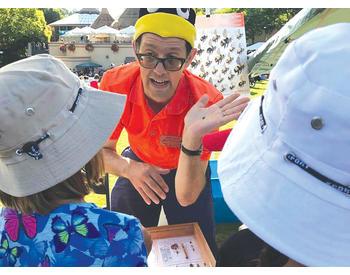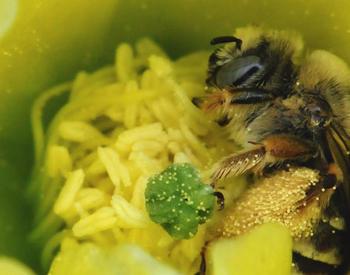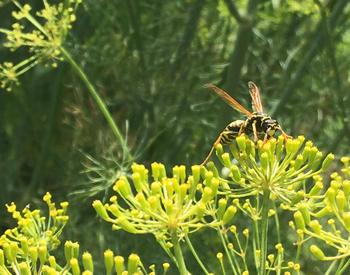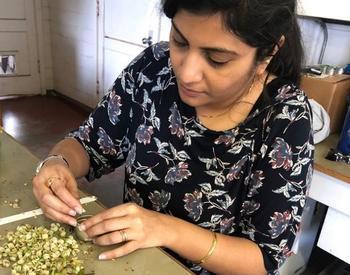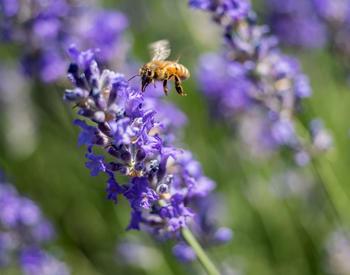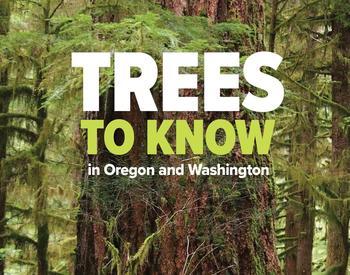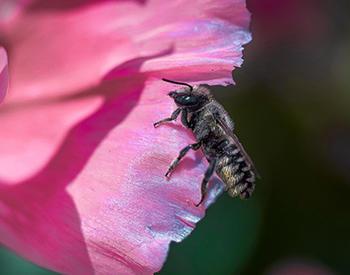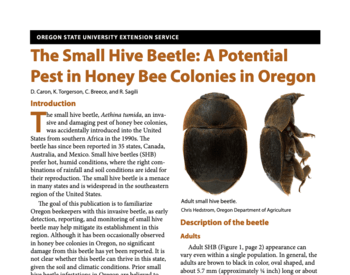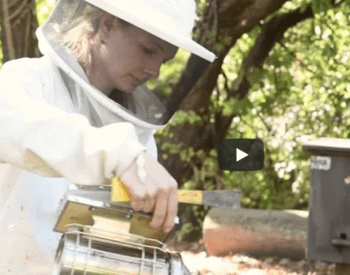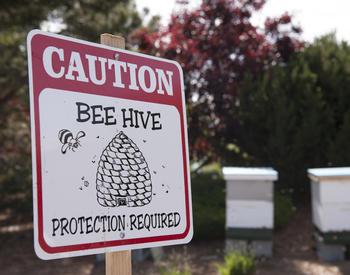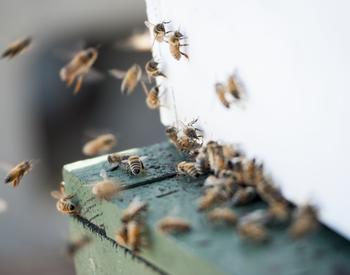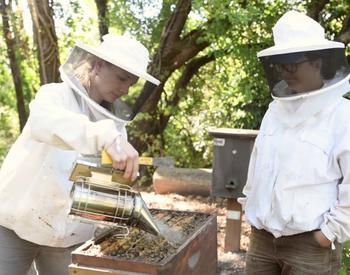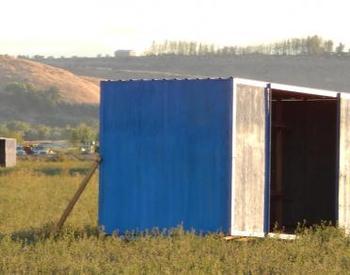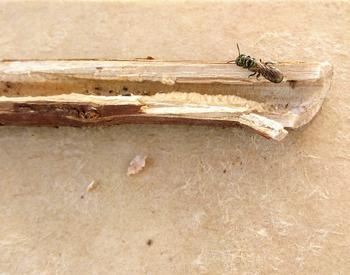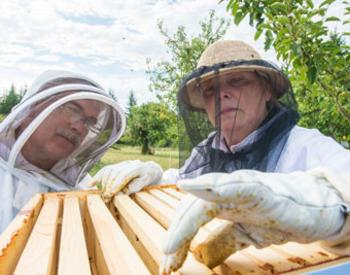Transcript
[00:00:00] Andony Melathopoulos: I attended my first in-person conference last week. The, in Denver, Colorado, the pesticide applicator certification and training conference. And I forgot why I love conferences, namely for meeting brand new. And being able to have an extended conversation with them out in the hallway. In fact, when I think about this podcast, I originally had conceived of it as a way for, making somebody up in the hallway and bringing those conversations to you, conversations you might not otherwise have.
I have to think throughout my career, these conversations have been pivotal in shaping the way that I think. And so this week I'm going to meet that standard because I think this is a conversation I'm going to be listening to over and over again. I had the great opportunity to talk with Dean Hertzfeld.
Now he's was as Barry last day with the national pesticide safety education center. But before that he was the cor coordinator of the university of Minnesota. Extension pesticide safety and environmental [00:01:00] education program for over 30 years, he'd been thinking about how we train pesticide, applicators, how they get to know what they know and how we evaluate our programs.
And in this episode, he's going to walk us through the history of where these. Programs came about they're national in scope or pesticide applicator learns how to use pesticides is of great importance when it comes to pollinators, because this is the really the frontline education that all parasite applicators get.
So the extent to which it's done well, a pesticide applicator, when they apply pesticides will be really conscious of what's going on with pollinators. Further ado, let's take you to the hallway outside of the pesticide applicator certification and training conference with Dean Hertz.
All right. Welcome to pollination, Dr.
Dean Herzfeld: Hertzfeld. I'm [00:02:00] happy to be here, Anthony and where we
Andony Melathopoulos: are. We're in Denver at the PAC conference. Tell us a little
Dean Herzfeld: bit about this current. So the PAC conference is the pesticide applicator certificate, train training national conference. It's typically held every other year was not held last year.
So it was delayed to this year for COVID reasons. And this is a conference that's been held under different names, going back many decades, and it brings together people involved with the certification and education of pesticide applicators. Recent years it's broadened to other stakeholders that find that have an interest, not just extension university, extension, and state lead agencies, but also other nonprofits and other stakeholders who have an interest in pest site safety education, and applicator's
Andony Melathopoulos: certification.
It's a great conference. I've really enjoyed meeting colleagues in extension who trained pesticide applicators people from. Departments of agriculture who are also involved in this division of [00:03:00] labor. And just maybe to, just to start off, I may imagine most of our listeners are unaware that pesticide applicators receive training.
Tell us a little bit about what an applicator experience, why does an applicator get training and what does this training look
Dean Herzfeld: like? It, it varies from state to state. And there's a little bit of a history piece on that. But it, there is a competency if usually Mo it's an exam that they have to take, and then there's continuing education and how the exam works.
And the extreme education works varies from state to state, but there are federal rules and federal laws that govern the standards of these things. States can add additional requirements of how the, his exams and certification go in my state of Minnesota. There's like a closed book exam for commercial applicators.
We do not. We're moving to a closed book exam under the new federal requirements for private applicators to becoming. Certified. And then the in commercial applicators, every two years either they'd have to have [00:04:00] a five-hour workshop or they can retake the exam to renew their certification. We have an annual license, but certifications every two
Andony Melathopoulos: years.
All right. And so I imagine we're at, as this comes to pollinators in some states on the exam, but also in that continuing education, you'd learn something about pollinators and pesticides and that's how. Applicator's will become aware of some of these
Dean Herzfeld: issues. Yes, exactly. That's the point of having the continuing education there's manuals that we write for each category.
So each category, like we have one for field crops, one for turf and ornamentals, one for aquatics. We have approximately a 20 categories in Minnesota. Some states have more, some states have less and the manual. Designed to go with the exam. We are mandated in Minnesota, under state regulation to include pollinator education, the pesticide applicators and that's not necessarily true in every state, but it's true in Minnesota.
So our manuals, our exams and our recertification. Does it include information about [00:05:00] pollinators for people who use pesticides, commercial applicators that do it for hire employees who apply for their employer and private applicators, which are primarily farmers.
Andony Melathopoulos: Now, one thing that I wanted to, I know, you know about, and I think our listeners would be greatly interested is where did this whole system come from?
Like where all it's, unusual. For states to all, maybe they do it a little bit differently, but to have a kind of a national, there is at least something done at an a, in every state where did this whole program where I
Dean Herzfeld: start I'll start in the 1970s. And I was alive in the 1970. I was in college in the 1970s.
I. Wasn't involved in this quite yet. I was doing my undergraduate and integrated pest management at Minnesota. And so I was aware of these things as an undergraduate going on some states had a certification type program or something. We would recognize a certification. But there was no national system.
And. The federal pesticide regulations were extensively revised when EPA was [00:06:00] created and it moved pesticide regulation from USDA to EPA, with new stricter health, safety, and environmental standards for registering pesticides that could be used in the United States. So there were quite a number of commonly used important pesticides that would be canceled their use canceled with the.
Standards. There was a lot of concern about the impacts of that Congress. And I read the transcripts debated about how do we deal with this? And they recognize that we needed additional education for people you handle and apply. These more hazardous
Andony Melathopoulos: pesticides. So let me get this straight so that the when EPA came into being, there was a kind of assessment of the pesticides that, that were widely used and some of them were deemed to require more, they would have been canceled otherwise.
And so the training came about to create sort of a class of applicators who [00:07:00] have training so that they could use these more. Pesticides.
Dean Herzfeld: Exactly. And we call those pesticides restricted use pesticides. That's
Andony Melathopoulos: what a restricted use pesticide is. It's a pesticide that requires a license
Dean Herzfeld: to apply. I'm gonna, all right.
Terminology is important. Different states use the term licensed certification differently. Okay. So I don't want to mislead your, to your users because in Minnesota, Licensing and certification are two different things. I'm involved in certification certifications, one requirement for the license in other states that's done differently.
So I don't want to lead somebody astray on that. Gotcha. But there was concern that these products would no longer be used. And so they came, they realized that if you had a higher level of training, that so that they were used more safely, that they could stay on the market. And so how do you get people to training?
We have to identify which products is our, so we, they created the restricted use pesticide classification because these products used would be canceled otherwise. And to get people to training, they [00:08:00] created a certification program. So you could track individuals to make sure they got that training.
Andony Melathopoulos: Ah, gotcha. Okay. And this has to be, for our listeners, this is different from the general use pesticide, something you could get at home Depot. Require a license or certification
Dean Herzfeld: for that's right. So you would have to have be certain national. I'll use the word certification because that's universal mat out of the federal language law language.
So you would have to be a certified applicator to purchase these products and to apply them. And in some states, the law. A certified applicator to supervise uncertified applicators, but with supervision to apply these restricted use pesticides in Minnesota, we've never done that. We've always had the actual applicator, every applicator who applied to restrict to juice needed to be fully certified, but there's quite a number of.
You can do it under the supervision of a certified applicator. Okay. So
Andony Melathopoulos: we have the state variation on the [00:09:00] interpretation of the federal the federal framework. What are the minimum standards of what and what does the federal government require of states to do when it comes to certification?
Dean Herzfeld: It, we have a brand new. Federal rule, which is a which are the regulations that implement federal law that governed the standards of what states are required to do for certification, competency, and certification education. The competency is typically looked at sea exam and we've gotten much better at designing exams.
A lot of work by my colleagues, and I've been involved with myself. Building exams that are more justifiable in terms of measuring competency on who should be certified and who should be certified. The manuals play a big role in that because of the study manuals and then the education for recertification, there'll be on the basic requirements and address more complicated and more detailed types of things beyond the minimum competency standards, [00:10:00] these exams address, and can.
New issues or unique things for that category of pesticide users in in, in a state.
Andony Melathopoulos: So let me just stop you. So if I understood you correctly, so federally there have been some standards of standards. The educational standards for the competency have become a little bit more rigorous recently, is that I understand that.
Yes.
Dean Herzfeld: And because they were last done in the late seventies
Andony Melathopoulos: at the very beginning.
Dean Herzfeld: Yeah. It's been how many decades and they're completely out of date for modern the modern world. And we've all struggled with that and it's very hard to get a world changing Congress. So I have my hats off to the people in EPA that led like a decades, long effort to have this done.
And I was, since some of those discussions so were the rules become more, they're a bit more standardization across the country. There were. A few standards for recertification education in the old world. And now we have standards for me. Certification education is one of the [00:11:00] good things about this.
Andony Melathopoulos: Tell us a little bit about how the state, one thing that I became aware of at this meeting is that different states have different there's two general ways in which. The continuing education is administered. One is what I've heard you describe as the workshop model. And there's another one that's different,
Dean Herzfeld: sorry, roughly half the states are divided on this and it has to do because states were given a lot of autonomy of how they design their program back in the seventies, under the federal.
New federal requirements. And some work, some states went to a workshop system where you attend a day-long or half a day workshop, depending on the category and the state where all of the content that was required to be covered is included. And you would have to come back every so many years. And in Minnesota we rotated content.
So we would tailor it to current issues. So some things we go in [00:12:00] great detail, some things we'd be more superficial depending on the needs and the concerns and the issues at the time. So you go to the workshop, it goes into the department of ag. They, then you can get your certification and you have to go every so many years in Minnesota, commercial applicators have to go every two years to a five-hour workshop and our farmers or private applicators have to be.
Three years to a half-day workshop to, or retake the exam. Other states use a continuing education unit or our system where you can go different educational events or conferences can apply for so many hours of continuing education university. Who's. State requirements. So you need so many CEOs and this type of topic and in this category, and it may take a, you may have two or three years to accumulate all of the CPU hours by attending different events
Andony Melathopoulos: the way it ha for listeners in Oregon.
That's how it happens in Oregon. [00:13:00] See you state. And so there's a if you're a licensed pesticide applicator, you can either go to programs put on by Oregon state university's pesticide education program, or there may be other groups putting these conferences on. It could be a commodity group and you would get elements, but even there, it's not just haphazard the state.
Lead agency has some responsibility for approving that training as being suitable.
Dean Herzfeld: That's correct. There are standards and they vary from state to state on the specifics and you have to do things differently for CU state versus a workshop state where Minnesota is a workshop state. And so we have a lot of control of ensuring the quality because the vast majority of the education is done by the university or in conjunction with industry association.
With the universities involved at their conferences. And there is a process to get that approved in, in through the Minnesota department of ag. And we can track things because we [00:14:00] have it all in. We're all involved with with the content and the topics and the quality the new federal rule actually Some re has put in requirements to that even in a CU state, you will have to meet certain minimum standards because there, there have been some states where the standards were, would say more loose in terms of CEU oversight, but with the new federal rule, it's gonna it's Nat nationwide.
There's going to be a higher standard to assure that quality. And that everybody gets the required topics that they're required both by the federal and states can add additional content that is required. That's more, more involved than what the Federal's fed federal rural requirements sounds
Andony Melathopoulos: fantastic.
What is the name of the new federal
Dean Herzfeld: rule? 40 CFR 1 71 certification training role. It was finalized in 2017 and it's still being implemented. [00:15:00] So it here at this conference, we had a workshop the federal EPA administrator who's overseas, as part of it gave a presentation about where we're at in that process.
So every state has to be. Has always had to put her in a state plan for their certification and training program that then is approved by EPA and maintain that plan and EPA assures that it meets the federal requirements. Then states can add additional requirements or content requirements if they wish the state level.
So the state plans are now being reviewed by APA to see if they meet the new requirements. And there's a timeline to roll this out over the next couple of years. So it'll be a couple of years yet before all the states will have their state plan and their certification program in compliance with the new rule.
It's you just can't turn this on a dime. It's a very complicated large system with lots of people. To change these programs.
Andony Melathopoulos: I hear the lunches coming out and I know you [00:16:00] have to give, you're going to be leading a workshop this afternoon. Tell us a little bit about that workshop on integrated pest management and how that.
Fits in with this certification system.
Dean Herzfeld: Sure. I was up until just real recently, cause I've been retired. I retired with the national pesticide safety education center, which is a subcontractor on a grant to. State university with the EPA to support meetings and engagement around pesticide safety certification, farm worker with relation to pesticides.
And we have various collaboration teams that bring in anybody can join broad stakeholders of interests. We have a series of these and what my job with the center was to facilitate a collaboration team that looked at. In common between A-grade pest management and pest site safety and even some invasive species pieces.
And there's a number of issues and conversations going on because from the user point of view, these are not separate [00:17:00] things. It's one thing, but institutionally you've put them in different silos and use different terminology. So we're working on, where do we go and how do we re frame IPM and maybe even, and how do we reframe the terminology so that we have a unified educational ability to reach people.
The way they do their work when they're doing pest management, which includes using pesticides. And don't forget in organic production, there's an awful lot of pesticides being used and they have to follow the certification and pesticide regulations just as synthetic pesticides do. We have a lot of.
Smart people here truly. And we're looking at how we can come together at the national level with all these different stakeholders and see where we can move this forward. So we have a stronger pest management program. That's more accessible, easier to do education and outreach on and easier. People who manage passing no [00:18:00] matter who they are to understand and adopt
Andony Melathopoulos: who knew that this area would be so fascinating.
And so historically a rich thank you so much for taking the time to talk with us today.
Dean Herzfeld: Thank you as well. This has been a pleasure, truly. Yeah.
Pesticide applicators across the US needed to become certified and trained. In this episode we explore where this training requirement came from and how it applies to reducing exposure of pollinators to pesticides.
Dean Herzfeld just stepped down from being on the collaboration team and education facilitator with the National Pesticide Safety Education Center. Before joining NPSEC last year he was Coordinator of the University of Minnesota Extension Pesticide Safety and Environmental Education program for more than 30 years. He was the past president, Fellow and charter member of the American Association of Pesticide Safety Educators and worked in the areas of personal protective equipment, IPM, invasive species, and educational program design and accountability.

